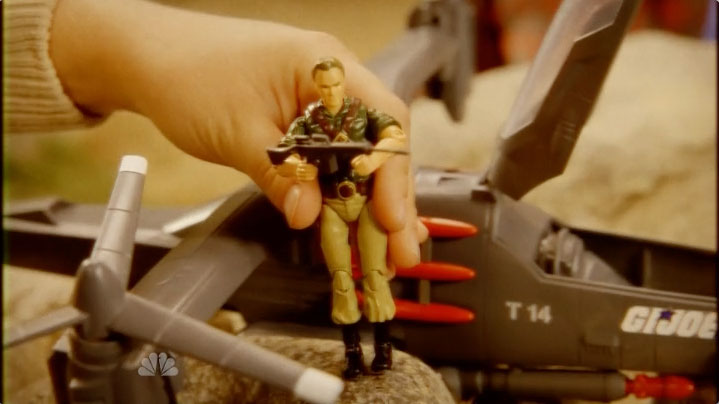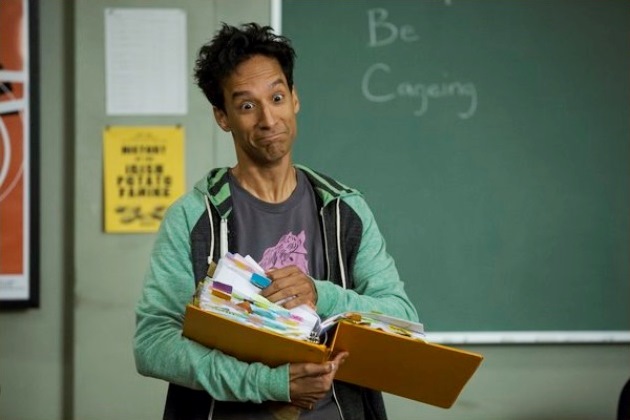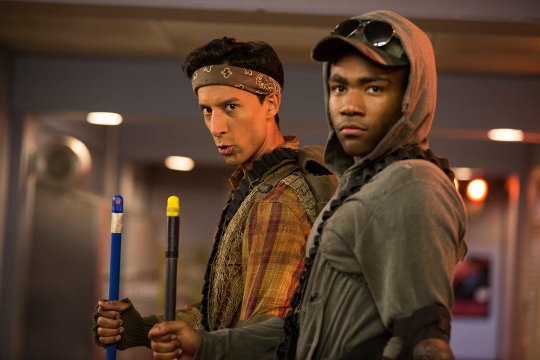While many people blame the absence of head writer Dan Harmon from Community‘s fourth season as the primary reason for its overall dip in quality, few point out why his departure was such a clubbing blow. It isn’t just that the show’s eccentric creator wasn’t around to shepherd his flock through a rather difficult time (fourth seasons are pretty hard to pull off under the best circumstances) but because the core element of what made the show function so well was missing. Community is considered outre, contrived, and needlessly self aware by its detractors, and the crew in charge of its fourth season managed to capture a lot of the trappings of the show, without the genuine heart that backed up those quirks. Harmon returned to run the fifth season, hoping to bring back that missing ingredient.
Harmon’s vision for the show isn’t a half baked commentary on fictional media for the sake of it, but a very human ensemble comedy that utilizes a language our generation is so fluent in: nostalgia.
Take the fifth season episode “G.I. Jeff,” for example. The majority of the story takes place in an animated facsimile of G.I. Joe, the classic and beloved animated series. The main cast are all adapted into Joe characters, as we slowly begin to realize that this all might be Jeff hallucinating. Ostensibly, lampooning an 80s cartoon seems like exactly the sort of thing this show is known for, because for a series set at a community college following a group of misfits through various trials and tribulations, the writing team has historically relied on theme episodes like musicals, stop motion Christmas specials, and brutally on-the-nose parodies.
“G.I. Jeff” fit into the oeuvre of Abed-centered episodes that utilize a break from reality: exploring some cartoonish pop culture referencing meta-land, to act as an extended metaphor for whatever unfunny, real psychological malady Abed was experiencing. Shifting these type of episodes onto Jeff Winger, a character who has always been contrasted against Abed in terms of mainstream masculinity and relative maturity, was an odd fit when attempted in the fourth season finale, and really felt more like awkward Tumblr fanfiction than legitimate experimentation.
But in “G.I. Jeff,” the humor drawn from injecting real world logic into the childish cartoon world of G.I. Joe works on multiple levels. Firstly, the surface is satisfied with broadly drawn jokes, calling to attention the hilarious inconsistencies of this fictional world. Secondly, as we realize this entire debacle is the result of Jeff mixing booze with pills at the horror of getting older, this side show turns out to be his suppressed desire to relive the simplicity of childhood manifesting as a colorful journey for the audience to take.
Why this? Why not something more comfortably sitcom-y to reach this point in Jeff Winger’s character arc? Because to Community‘s audience “absurdist cartoon hallucination” makes perfect sense as shorthand for midlife crisis. We’re a generation weened on the plentiful bosom of film, television, comics, and video games, a multipurpose teat that’s fed us questionable nourishment our entire lives. These media are the prism through which we perceive our own reality. We watch television to live vicariously through its characters, which are generally cyphers designed to remind us somewhat of ourselves. Obviously, the next evolutionary step for television designed for Gen-Y consumption would be a show as preoccupied with the trappings of popular culture as the people who watch it.
The aforementioned Abed Nadir has long been the prime focus of this show’s thematic concerns, acting as the stand-in for the arch-level geek stereotype, albeit with a more layered and nuanced portrayal. With Donald Glover leaving the show to pursue his rap career (and his own upcoming series on FX), Abed was left without his Troy. Without that friendship to ground him throughout the fifth season, Abed has flailed wildly, as seen in “Introduction To Teaching” when he spiraled while struggling to understand the eternal mystery of Nicolas Cage. Again, a plot point that sounds so deliciously Community-like succeeds not because of its naked obsession with movies, but because it takes very human, very IRL concerns (ie: getting by in a constantly changing world without the one person who understands you) and translates it to something goofy and comedic without losing that initial emotional core.
I’ve spent a lot of time this season trying to convert friends of mine into watching Community and there’s been considerably more resistance than I would have expected. This resistance hasn’t come from people who “wouldn’t get the humor” or are turned off by the sort of hijinks that go on within the show. These are all people who can readily quote Kevin Smith films and who self-identify as specific Star Wars characters. Some of that reticence comes from the way the media landscape has shifted in recent years.
The Two Seths (McFarlane and Green, of Family Guy and Robot Chicken fame respectively) trade in a similar brand of humor, but it is often utterly without substance. Sure, McFarlane and Green both prey on the same audience, the people who own the same Chuck Klosterman books and lose hours of their lives on TVTropes, but they’re the McDonald’s and Burger King of referential comedy. It’s nothing to crack a joke whose entire punchline is “Remember Airwolf?” but it takes more heart to use someone’s knowledge of 80s television trivia to tell them a story that will affect them on a deeper level.
I suppose in this analogy, Community is essentially Subway, which isn’t the biggest step up, but is at least trying to give you some measure of substance.
Now, I am not out-and-out dismissing either of those shows. I’ve watched a vast majority of both of their runs and have laughed and enjoyed myself, but their success is built around the same sad facts that propel shows like The Big Bang Theory to the forefront of the Nielsen ratings.
Mainstream audiences are more comfortable with a surface reading of pop culture humor. The mere connection of “oh, I recognize that” is enough for them. In other cases, they’re comfortable seeing geek culture and the denizens thereof hoisted up as targets of humor rather than active participants. It’s so much simpler to have a show where an Aspergers-affected nerd makes an offhand remark about The Flash than it would be to explore what his love of comics says about his character. Easier to dress your protagonists up in Teenage Mutant Ninja Turtle tees than to explore how the dynamics of their friendships subconsciously mirror the fictional heroes they idolized as youths. Maybe it’s better that way, though. Experimenting in the other direction leaves you teetering on the edge of cancellation, continuously forced to beg your scant few viewers to crusade for your salvation through aggressive blogging and hashtags.
Harmon and company aren’t perfect. This season had its fair share of less-than-stellar outings. “Basic Intergluteal Numismatics” is something of a failure, crafting a serviceable send-up of the prestige thriller genre centered around the “Ass Crack Bandit” which is exactly as silly and misguided as it sounds. “Geothermal Escapism” goes to the “Abed & Troy dodge reality” well one too many times, sullying Glover’s send-off by delivering a watered down revisit of former glories. Even that misfire functions admirably, as the let down it foists upon the audience is, at least somewhat, intended to engender the same feelings of nostalgia in loss as the characters losing their long time friend. The two part (series?) finale, while a lot of fun, also suffered from a layer cake of meta levels, at once commenting on the characters’ cumulative necessity for hijinks to distract from the new found mundanity of their increasingly comfortable lives and the very real danger the show itself is in of being renewed for another season.
Whether boon or Achilles’ heel, Community‘s preoccupation with finality, harmony, and security function both as commentary on the uncertain world of the television industry and this thing we call life.
In the age of the Internet, consumers of popular culture are savvier and more complex, having long since evolved past the stereotype of geek/nerd/whatever you Outcast Identify as. Community is the show that exists in response to that very same evolution. Whether season five is its last or if we’ll finally see #sixseasonsandamovie come to fruition, one can only hope future television comedies learn from its rampant experimentation in developing the next generation of thirty minute laughers.





